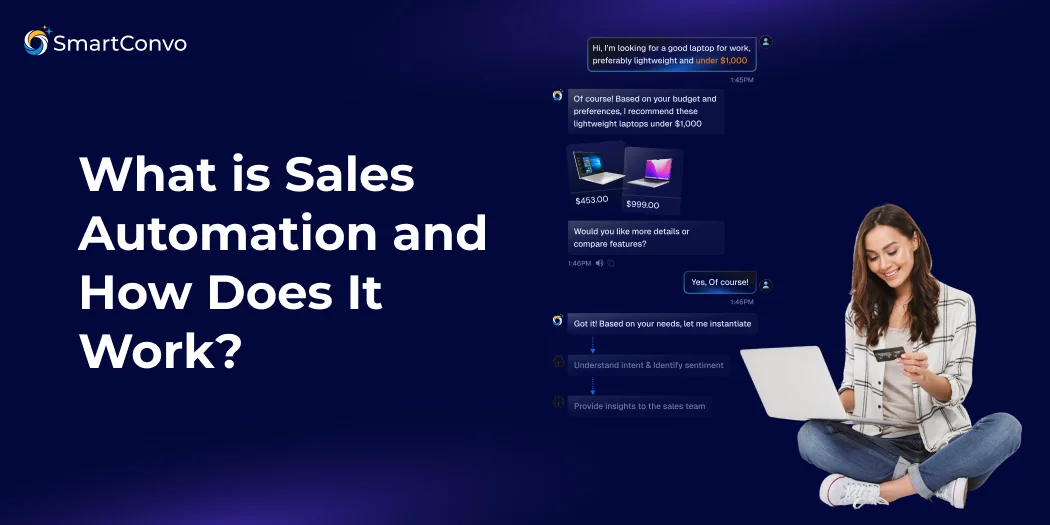The future of business is automation and personalization, and nothing embodies the blending of these two forces better than AI sales chatbots. Imagine a world where your business is available 24/7, ready to engage customers, boost conversions, and provide personalized experiences—all without increasing operational costs. Sounds too good to be true? It’s not.
With advancements in AI for business and conversational AI, 2025 is shaping up to be the year where AI sales chatbots redefine how brands sell online and interact with customers. Whether you’re a small business owner or leading an enterprise, adopting an AI sales chatbot is no longer a luxury—it’s a necessity.
This guide dives deep into why AI-powered sales AI chatbot software is transforming industries, the benefits it offers, and how you can integrate one for maximum success.
What is an AI Sales Chatbot?
An AI Sales Chatbot is an advanced digital assistant powered by artificial intelligence, capable of mimicking human interactions. Unlike traditional chatbots that only provide pre-programmed responses, AI-driven Sales Assistant Chatbots offer smarter, more seamless customer experiences. These bots actively engage prospective customers, answer their queries, recommend products, schedule demos, and even close sales—all without human intervention.
The secret sauce? Tools like generative AI, conversational AI, and large language models (LLMs) make these bots intuitive, learning from each interaction to improve over time. Think of them not as a cost-cutting measure but as a revenue-generating asset.
The Benefits of AI Sales Chatbots for Businesses

Here’s why investing in an AI sales chatbot in 2025 is a game-changer.
24/7 Customer Support
Your customers don’t operate on a 9-5 schedule, and neither should your business. An automated sales chatbot ensures that inquiries are handled at any time—whether it’s a casual pre-sale question or a more pressing need. By providing around-the-clock support, you never miss an opportunity to connect.
For instance, imagine a global audience browsing an e-commerce store at midnight from different time zones. Having a bot readily available ensures no sale falls through the cracks.
Enhanced Lead Generation and Conversion
AI Sales Chatbots can qualify leads in real time. Instead of manually sorting through potential clients, these bots ask the right questions to gauge interest, budget, and intent—passing only the most promising leads to your sales team.
For example, an conversational AI chatbot for sales in real estate can ask users about the type of property they’re seeking, their budget, and preferred locations, creating a personalized experience while saving agents countless hours.
Cost-Effectiveness
Hiring additional human staff to handle sales inquiries can strain business resources. A sales chatbot software eliminates the need for extra personnel while handling the workload of a team. This translates to lower overhead costs without compromising service quality.
Personalization and Data-Driven Insights
Want to customize each customer’s experience? Chatbots analyze user behavior and preferences to tailor recommendations. Over time, they generate valuable data-driven insights, helping you refine marketing strategies and improve customer satisfaction. This approach mirrors how AI for business creates efficiencies by maximizing data utilization.
Quick Resolutions for Routine Issues
Common questions like pricing, shipping policies, or return procedures don’t need human intervention. With preset answers delivered instantly by chatbots, you save time and give customers exactly what they need—fast.
Reach Global Audiences
Don’t know how to handle clients in different languages? Modern sales chatbot AI software comes armed with multilingual capabilities, ensuring it can serve a global audience without friction. This is crucial for enterprises in industries like travel and hospitality, where international clients expect tailored support.
Steps to Implement an AI Sales Chatbot for Your Business

Implementing a sales chatbot might seem daunting at first, especially if you’re new to the technology, but it doesn’t have to be. With the right approach, you can set up a chatbot that enhances customer interactions and streamlines your sales process. Follow these simple steps for seamless integration, and you’ll be up and running in no time.
Identify Your Goals
What do you want the chatbot to do? Is its primary purpose to serve customer inquiries, providing quick and accurate responses to common questions? Or are you looking for it to generate leads, capturing potential customers’ details and guiding them through the sales funnel? Perhaps you want it to close deals, assisting users in making purchases or finalizing decisions. Clearly defining your goals is essential to ensure the chatbot aligns perfectly with your business needs and delivers real value to your operations.
Choose a Reliable Provider
Look for skilled vendors offering conversational AI chatbots that have proven experience across various industries to ensure reliability and expertise. Check if their solutions are customizable to meet your specific business needs and confirm they allow seamless integrations with your existing systems for a smoother implementation process.
Define the Chatbot’s Personality
Will your bot communicate formally, maintaining a professional and polished tone, or will it adopt a playful, casual approach to connect with users? Its “voice” should not only align with your brand’s ethos and identity but also resonate with your target audience, creating a memorable and engaging experience. Striking the right balance is key to fostering strong relationships and ensuring users feel comfortable interacting with your bot.
Test and Optimize
Before rolling out, test the chatbot extensively to ensure it functions smoothly and delivers a positive user experience. Address any bugs or technical glitches that arise during testing, and gather detailed feedback from users to identify areas for improvement. Continuously monitor key performance indicators (KPIs) such as response accuracy, user satisfaction, and engagement rates, then use this data to make iterative improvements. This thorough process will help ensure the chatbot is effective and meets user expectations.
Key Industries Benefiting from AI Sales Chatbots
Which industries are leveraging chatbots for sales most effectively? Here are a few examples.
E-Commerce and Retail
From personalized shopping recommendations to quick checkouts, chatbots help e-commerce businesses streamline user experiences and boost sales.
Healthcare
AI chatbots assist with appointment scheduling, answering FAQs, and even providing health recommendations based on user input.
Real Estate
Real estate chatbots engage leads by sharing property listings, booking tours, and answering queries on pricing.
Travel and Hospitality
Travel bots help customers book trips, check flight statuses, and suggest destination packages at competitive rates.
Banking and Finance
From helping customers track expenses to answering banking queries, financial institutions are offering smarter solutions with AI.
How to Choose the Right AI Sales Chatbot for Your Business

Selecting a chatbot tailored to your needs is crucial. Here’s how you should approach it.
Define Your Objectives
Determine whether your business needs customer support to assist existing clients, lead generation to attract new customers, or a combination of both to drive growth and improve overall satisfaction.
Know Your Target Audience
Customize the bot’s features and tone to align with your customers’ needs and preferences, ensuring every interaction feels personal and tailored to their expectations.
Test Usability and User Experience
Ask yourself, is it intuitive enough for both your team and your customers to use effectively? Consider whether the design, process, or tool is easy to navigate, understand, and implement for everyone involved.
Evaluate Integration Capabilities:
A great bot integrates seamlessly with your CRM, HR knowledge management systems, or other software, ensuring smooth workflows and providing instant, accurate support. By connecting directly to these tools, the bot can access and utilize critical information, making it easier to handle tasks efficiently and improve overall productivity.
Security and Compliance
Protect your business with robust encryption to safeguard sensitive data and ensure compliance with key regulations like GDPR. By prioritizing data security and privacy, you can build trust with your clients while reducing the risk of breaches and penalties.
Consider Scalability and Future Needs
Choose a bot that evolves with your business, adapting to your needs and scaling effortlessly as you grow.
Seek Feedback and Reviews
Consult with other businesses that have successfully implemented similar solutions to gain insights, learn from their experiences, and understand potential challenges or best practices.
How Can SmartConvo Help You with the Best AI Sales Chatbot?
Looking to leverage the power of AI to transform your sales strategy? SmartConvo provides cutting-edge LLM chatbots designed specifically for your industry needs. These advanced chatbots not only deliver seamless CRM integration but also boast powerful conversational AI sales, engaging customers like never before. With a strong focus on security compliance, SmartConvo ensures that your business operates safely while maximizing the value of your chatbot investment. Whether you’re looking to improve lead generation, enhance customer support, or streamline sales processes, SmartConvo tailored solutions are here to help you achieve your goals more efficiently and effectively.
Turn your data into a smart chatbot that understands your business and delivers instant, accurate responses. Get started today and see how your data can drive smarter conversations and boost efficiency across your organization.
Get Started Today

Conclusion
An AI sales chatbot isn’t just a tool—it’s a powerful ally in creating better customer experiences, streamlining processes, and driving business growth. These chatbots can handle inquiries, qualify leads, and even close sales, all while providing a seamless, 24/7 experience for your customers. By automating repetitive tasks, sales teams can focus on building relationships and closing high-value deals. Whether you’re just starting out or scaling up, adopting chatbots for sales is no longer optional in 2025—it’s essential to staying competitive in a fast-evolving market.
Is your business ready to take the leap and embrace this game-changing technology? Start exploring solutions with SmartConvo, AI chatbots for sales can enhance customer interactions, streamline lead generation, and boost conversions. With SmartConvo, you’ll be equipped to meet modern customer expectations and set your business on a path for long-term success.
Frequently Asked Questions (FAQ)
While there’s an initial cost, long-term savings from reduced staffing needs and increased customer satisfaction make them cost-effective.
Prices vary, but most providers have flexible packages tailored to small businesses and enterprises alike.
Instant responses, personalized interactions, and 24/7 availability ensure higher satisfaction rates.
AI chatbots complement, not replace, human teams. They handle repetitive tasks, allowing sales staff to focus on high-value interactions.
Metrics like customer satisfaction scores, average response time, lead conversion rates, and cost savings help evaluate performance.













